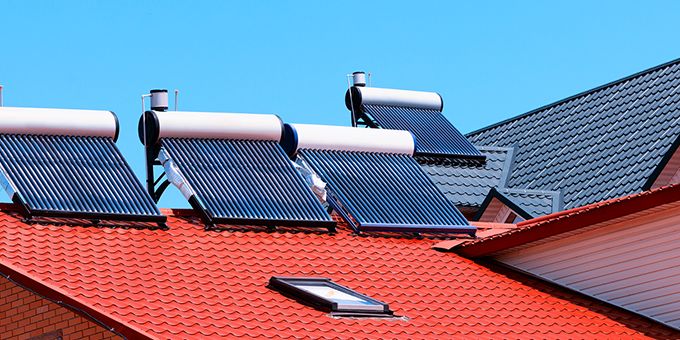A solar water heater can reduce a homeowner's water heating bills by 50% to 80% on average. Though the equipment may cost more than a basic water heating system, the long-term cost savings are crucial to acknowledge.
 How Can Solar Water Heaters Become Standard in Residential Homes?
How Can Solar Water Heaters Become Standard in Residential Homes?

Emily Folk | Conservation Folks
Homeowners are often hesitant to purchase a solar energy system for their property. The high price of the equipment can act as a deterrent, and conventional options are more familiar. Not everyone is willing to commit their time to learning about eco-friendly alternatives, even if those solutions save them money.
As context, a solar water heater can reduce a homeowner's water heating bills by 50% to 80% on average. Though the equipment may cost more than a basic water heating system, the long-term cost savings are crucial to acknowledge. That said, solar water heaters have additional benefits which are just as appealing.
When a homeowner invests in a solar water heater, they protect themselves from future fuel shortages and price hikes. They also decrease their dependence on fossil fuels and reduce their carbon footprint, an attractive prospect for environmentalists. These systems clearly have a diverse variety of advantages.
So how can solar water heaters become standard in residential homes? How can industry professionals increase the popularity of these systems among homeowners? Ultimately, it's the decision of the homeowner, but certain strategies may convince them to adopt this relatively niche equipment.
1. Discussions With Customers
An increasing number of homeowners have shown interest in solar panel technology over the past several years. Fortunately, many of the same incentives and rebates that apply to solar panels also apply to other options for solar heating. Bringing them to the attention of customers will prove important.
These customers may not know about the full range of solar technologies that are available to them. A solar installer may choose to inform a homeowner about their selection of solar energy systems, as well as the fact that it's often more cost-effective to pay for multiple home improvements at once.
2. Expanded Federal Programs
The U.S. government already offers residential renewable energy tax credits for homeowners interested in solar energy. These deductions are helpful, and they've encouraged greater investment in renewable energy, but the program can still improve. The government could redouble its commitment to renewable energy.
Though it isn't the most realistic option with the current administration, it has significant potential for normalizing solar energy systems. In addition to solar panels, homeowners will show a willingness to invest in alternative options like solar water heaters, solar space heaters and similar systems for solar heating.
3. Increased Public Awareness
Next to other options for solar energy, solar water heaters are relatively obscure. Homeowners aren't always aware of what they are, how these systems work or their economic and environmental benefits. With a better understanding of solar water heaters, homeowners would feel more comfortable with an investment.
To provide a relevant statistic, over 40% of the electricity bill in the average U.S. home is a result of air conditioning or heating. A homeowner may view this data as sufficient motivation to seek alternative solutions for their current setup. They won't move forward with a purchase until they have adequate information.
4. Special Deals and Discounts
Solar energy companies should also address the subject of pricing. As mentioned earlier, the high price of solar energy systems can act as a deterrent, and an otherwise interested homeowner may choose to look elsewhere if they can't afford the equipment. Government incentives aren't always enough.
Companies might account for this issue with special deals for solar water heaters. Of course, the availability of these discounts will depend on the time of year, whether the customer meets certain requirements and other criteria. Naturally, a reduction in price would increase interest and drive purchasing decisions.
Forward Progress
Solar water heaters are an effective alternative to the standard equipment in most residential homes today. Even so, homeowners are often unwilling or unable to invest in the technology, and some are unaware it exists at all. However, this will gradually change if stakeholders in renewable energy take action.
In time, solar water heaters may see widespread adoption across the United States. Until then, industry professionals should continue their efforts.
The content & opinions in this article are the author’s and do not necessarily represent the views of AltEnergyMag
Comments (0)
This post does not have any comments. Be the first to leave a comment below.
Featured Product

